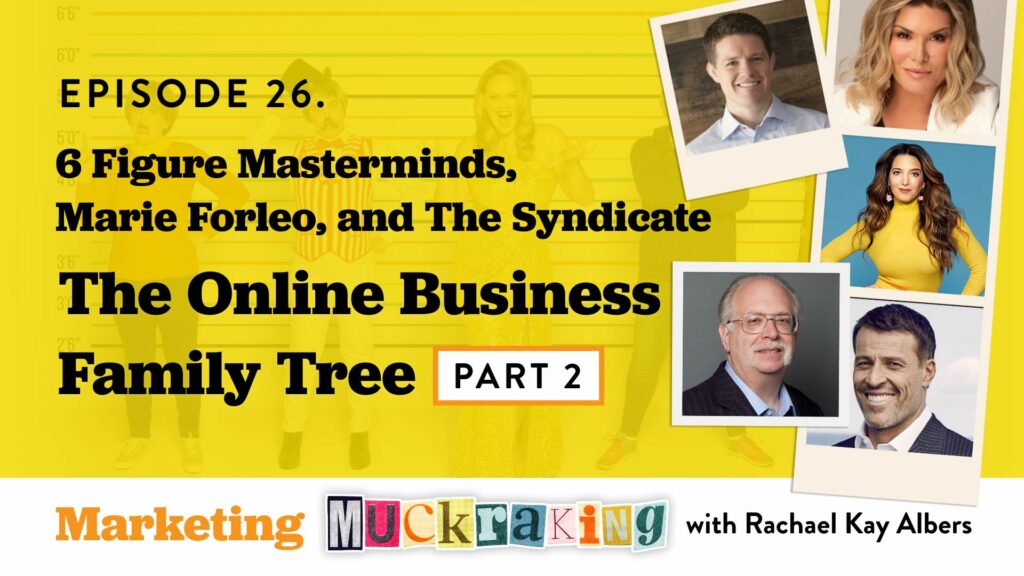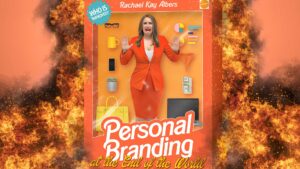The #1 question I get from Marketing Muckraking fans is: "How do I build a more ethical business?" followed by,"What does ethical marketing look like?"
The answers to these questions are more fitting for a book (or a long conversation over coffee and croissants) than a blog post but I do have some thoughts. So, if you're a business owner or aspire to run a business as ethically as possible, grab your cappuccino and press play (or read the text version below).
Once people listen to The Online Business Family Tree Series I'm hosting with Lisa Robbin Young, they're sold on how online business is selling us out, but they still want to know what to do next:
"Okay, RKA! The Online Business Industrial Complex is f*%ked! I agree! So what do we do instead? What is the way to ethically market a business, RKA?"
First, the bad news: there is no one-size-fits all, easy 10 steps that you can apply across the board to every business and go on your merry way, easy peasy lemon squeezy. You have to start by first looking at your business structure itself, your business model, how your products and services and offers are arranged and priced — the way your business runs. Because your business model doesn’t live in a separate universe from your marketing.
If you listen to The Online Business Family Tree series, we talk about B-School, for example, and how the pricing structure of B-School is connected to its marketing model. B-School marketing, especially in the early days, was largely affiliate-based where affiliates took home 50% cuts. B-School pricing had to be inflated so that Marie could still profit off the program. Her marketing and business structure go hand in hand.
Once you start to examine how business structure and marketing are connected, and then you look at the greater business landscape — what it takes to be competitive in the marketplace, and what it took for the members of the online business family tree to be successful and get to the top — that's when you're forced to confront how the system that we must market within is inherently unethical. Modern global neoliberal capitalism — as it’s practiced today, not in theory — is an unethical economic system.
That's what makes answering the question, “How do I ethically market my business?” so complicated because it means confronting the challenges of trying to ethically market your business within an unethical system. In other words, the quest to ethically market your business — if you're really looking at how business is structured today — will hopefully make you an anticapitalist.
So, then the question becomes, “What compromises must I make? What do I have to do as a stopgap now to survive within this system?”
Because we all have to survive. There is no alternative. We can't escape capitalism. Even if you go to a country that has a different economic system, every country in the world today is still benefiting from and depending on modern capitalism.
There's no escape. So, then it's not about “What is the 100% ethical way to market?” but, “What can I do today to survive and find my enoughness number?” as Lisa Robbin Young describes it. We must search for our enoughness while building towards a better system.
If you were to make a list to review some of the tactics that Lisa and I laid out in the Online Business Family Tree series:
- FOMO
- Manufactured urgency and scarcity
- Speaking to shame and manufacturing shame
- Artificially inflating the perceived value of an offer so people will spend any amount of money to be in the room with you
- Building trust through parasocial bonds and proximity to power in the age of the personal brand and SEO-optimized friendships, etc.
These tactics work because they work within the design of capitalism. That means it's impossible to look at unethical marketing and critique the Online Business Industrial Complex without ultimately critiquing the system that makes these tactics so effective.
If you are passionate about building a business that runs in an ethical way — about marketing your business in an ethical way — you will continue to face ongoing challenges and threats to your profitability because the system is designed for us to amass wealth at any cost.
Capitalism is not designed to reward us for being ethical. This is why people had to fight for labor rights. This is why unions exist. It's impossible to go on the quest to be a more ethical marketer without going on the quest to examine why this system is harming us.
But that still doesn't answer the question, “What do I do today, RKA?”
Here’s what I think it means to build a more ethical business today — with the understanding that a 100% ethical business is not possible within capitalism.
1. Building a more ethical business is a long game.
There are no easy, quick shortcuts to the top of the pyramid. Shortcuts may include things like exploiting laborers, reselling resources for less than they're worth, exploiting the land and its people. That's an “easy” way to get to the top. But is it ethical? No.
Building a more ethical business is a long game because, all the things I mentioned before — manufactured scarcity and urgency, building trust through FOMO and proximity to power — all of that is about going faster. If you want to build trust with your audience, that takes time. Listen to my episode of Marketing Muckraking on this topic.
2. Building a more ethical business means leaving money on the table.
Many of the people that we outlined in the online business family tree — Russell Brunson, for example, has this ethos that you don't leave any pennies on the table. And Lisa Robbin Young said, “Sometimes those pennies aren't yours to claim.”
I love that and I also love what Lisa said in her TEDx about finding your “enoughness” number versus shooting for endless profits. When you are building a more ethical business, you will find opportunities to do it faster to make more money. And oftentimes those opportunities won't be ethical.
Building a more ethical business means making peace with essentially taking a paycut. It’s not about six figures, then seven figures, then eight figures — it’s about finding your “enoughness” number and then finding a way that you can maintain that while also paying the people that work for you their enoughness number.
3. Building a more ethical business means paying people good money for good help.
You're leaving more money on the table because you're giving it to the people who are supporting and helping to run your business. You're paying your workers well, from day one, and you're keeping their enoughness numbers in mind.
I guarantee you that every single name that we named in The Online Business Family Tree series got to their level of profitability — their multimillions or even billions — by paying people as little as possible. Maybe they pay certain members of their team well, but everybody else at the bottom gets paid peanuts. And that is the model that they pass on.
They love to talk about how you should hire somebody in a different country that has a lower standard of living and pay them whatever they'l accept as payment, as if you're doing them a favor. No.
Now I know you might be thinking, “But RKA! I literally cannot afford to pay people more than I'm paying them right now!” Maybe you do have assistants or contractors in other countries that you're paying less than you would pay if they were US-based. My answer to this would go back to the long game idea.
Are you paying people less than the value of their labor because you're trying to go faster in business and get to the top? This dilemma makes us re-confront the way that capitalism is designed and based around exploitation. If the only way you can be profitable is for somebody else to get paid less than the value of their labor, that sounds like a system that's designed to screw us all over.
Hiring people to help support your business costs good money. If the only way to arrive at your enoughness is to devalue someone else's labor, maybe it’s time to go back and look at your business model — and then look at the system that forces you into this conundrum.
I talk to business owners all the time who tell me, “I can't afford to pay more than I'm paying people, but I really want to scale!” This is where the system is forcing you to exploit others for your own enoughness. And that's why, hopefully, the quest to become a more ethical marketer and business owner will make you an anticapitalist.
4. Building a more ethical business means being really good at running all the aspects of your business.
The sad truth that people don't want to hear is — you have to become really good at working in all the areas of your own business until you are profitable enough and bringing enough revenue to bring on good people that you can pay good money to help you. This is why I do my own podcast editing. This is why I make my own videos and write my own copy.
Disclaimer on the above video: I made it when I was still kissing Marie Forleo's a$$. Sigh.
Part of not choosing to delegate these things is because creating content for my type of business is something that only I can do. My content — my art, if you will — is based on my ideas and unique world view. So I can’t easily delegate that. That's the type of business that I run.
There are things that I do delegate, but only when I can afford to pay good money for good people to help me. And if I can't afford that, then I've got to build a business model that is sustainable for me to do most of the work and allows me to keep my profits until I grow to a point where I can bring people in and pay them well to support my growth. It's become so normalized for celebrity personal brands to encourage their clients to pay contractors the lowest wages possible, as if we’re doing them a favor, because they just want an opportunity to learn and grow or they’re in a different economy. I reject this.
So, how do you build a more ethical business today?
You go slow because it is a long game. You learn how to get really good at doing all of the things in your business that need to get done until you are profitable enough to pay really good money for really good help. It means leaving money on the table.
Now you can see why people don't talk about this. It’s not sexy. It's not good news.
People want to come to me and say, “Okay, RKA! I hear all the muckraking. Please tell me the easy peasy lemon squeezy way so that I can get profitable ethically — and as quickly as possible?!” And that answer does not exist.
But people also ask me, “RKA, how did you build your business? Tell me how you did it!”
Here's how I built my business:
Slowly — I built my business slowly.
I think my first year in business, I made roughly $3,000 in gross revenue for the year. In my second year, I made roughly $7,000. In my third year, I made roughly $10,000. In my fourth year, I made roughly $17,000. In my fifth year, I made roughly $44,000. And in my sixth year, I finally cracked $100,000. And guess what?
Let me tell you something about that six figure pinnacle that I finally reached. In online business, there’s so much emphasis on hitting that coveted six figure mark! (And again, we’re still talking about gross revenue, in my case, not take home.) The year that I made six figures in revenue, I took home less and profited less than the year I made roughly $44,000. And that's partly because the year I cracked six figures was the year I brought on more contractors to help me. So, where did my money go? It went to them.
I have worked with hundreds of businesses over the years — many of which have scaled models very different from mine. They've got courses, programs, memberships, events, books, et cetera. I have seen what it takes to make a scaled business profitable — and I've helped them to grow their profits — but after seeing what it looks like to run a business like that, I decided that’s not what I wanted. I have friends that run big agencies where they're making millions of dollars in revenue, but oftentimes they take home less money than I do, which is part of why I chose to keep my business lean.
But I also keep my business lean because I enjoy doing all of the different things and not having my job primarily be sales or managing a team. I love going into a company and doing spot consulting just for a day. I love working with someone to create a comprehensive marketing plan for the next two years. I love being able to work on the all of the creative elements of a rebrand — from the design, to the messaging, to the website, etc.
How do you make a scaled business run? You need one (or all) of the following things:
- A massive audience
- A network of affiliates or JV relationships with folks who have a massive audience
- Ads
- Funnels
- Paying people the lowest rate possible
I was just talking to a friend works in one of these big celebrity personal brand companies. And she told me, “We built 100 funnels this year!” and I'm like, “Oh my God, that's my nightmare!” But that’s how a scaled business runs — audience, network, volume, ads, and funnels all day every day. It’s not for me.
Finally, I think it's important to note here that the ease of which somebody builds a business from zero also comes down to a number of factors that aren’t in their control. I’m a white, educated, American woman. I have a postgraduate education that was made possible by coming from an upper middle class family. All of that stuff made it easier for me to build a business and, no, I didn't earn any of that.
I'm an extrovert with a theater background and I'm really good on sales calls because I like to connect with people and talk to them. I enjoy networking. Those are skills and privileges I brought into the game that I did not earn. All of that made my trajectory easier.
I'm here on a Sunday morning making content because I like it. That's an existing skill set that not everybody has.
And even with all of that existing privilege, I also work a lot. Now, since Free School, I have dramatically reduced how much I work. And yet, even though I work less, I still work more than I should. I work a lot. I worked a lot in the beginning. I didn't have kids. I worked seven days a week for many years.
And was that healthy? Was that sustainable? Am I glamorizing that? Absolutely not. It was not healthy, sustainable, or glamorous. And it was boring! That’s the other side of building a business that people don't like to talk about. Building a business requires many long days doing admin and the thankless, non-sexy stuff behind the scenes. Everybody loves to do a rebrand and design a new logo and new colors and come out with a new offer and do fun things on social media. But that's not the brunt of building a business.
The real business building is long days of not-so-sexy things.
Another part of my personal story is that I am the provider. I am the breadwinner. I do not have a second income and I never did. This gives you some additional context for why I work so much. Hell, I worked in the hospital when I had my baby!
And I am not glamorizing that. But the truth was, I simply did not have a type of business where I could go dark or leave my business for 12 weeks and let it go run without me. My business does need me. And I told you why I've designed it that way.
But the reality of building a massively scaled company where, as the founder I can step out for four months, is harder than people make it look. And typically it's because they're paying the people who are running the business for them less than they should be paying them. So I didn't have that luxury. I had to work and I didn't take a maternity leave. This is the truth.
Part of the reality of some of these big 7 or 8 figure success stories is that to get to that point, they started out by having a second income — a second earner in their household that took care of the household stuff while they built the business. They were also playing the long game way in those early scrappy days — because most businesses, ethical or not, are still playing the long game. There is no easy way to go from zero to $100,000 in less than 12 months unless you're fucking around or just happen to be very lucky.
The other piece of my story that's important to remember is that I lived in Mexico for eight years.
I started my business — not because I cared about being a business owner — but because I was doing pro bono work with young women and girls. I started my business to fund that work so I didn’t have to vie for NGO funding or take that funding away from an organization. I funded myself. But, I was also living in an economy with a lower cost of living, while earning the dollar, which was what made it possible for me to survive on so little gross revenue in those early years.
In the case of so many 7 or 8 figure success stories, if they don't have a second earner in their household, they have funding of some sort. Maybe they have a wealthy family member or an investor that's willing to give them $50,000 or $100,000 to start the business and help them get out of those early scrappy business years. Or maybe they've got a credit card with a big limit.
In my case, I didn't get funding, but I did have a $5,000 credit card that I maxed out in those early years of business so that I could afford to live. These are the untold pieces of the business building story.
And while I acknowledge that I brought a ton of privilege into this process, I won't say that I didn't work many long days and that it wasn't hard work. Of course, it was hard work — it was hard work and I had the benefit of privilege. It was both at the same time. This stuff isn't sexy to talk about, but it’s the reality of what it is to be in business today.
I cannot recommend Lisa Robbin Young’s TEDx talk highly enough.
Lisa talks about finding your enoughness number. This number — what you need to live well, enjoy your life, and take care of yourself and your family — will look different depending on your circumstances. In her talk, Lisa shares about how some people have aging parents, some people have a household full of kids, some people have disabilities, or are multiply marginalized. My number and your number may look very different, but it's about finding your enoughness instead of striving for endless wealth just for the sake of it.
Finally, the last thing I'll say on this topic is that you may reach a point in your business that everything is finally running smoothly and profitably and you realize you want to change. Guess what? That means, in many ways, you're starting again — you're building a new business.
In my case, I'm working on writing this book and I'm trying to find the right publishing partner. I've got an amazing agent and, yet, publishers want to see my built-in author audience. So, the amount of content I'm creating these days — you’re essentially watching me do my side hustle from scratch. My side hustle is building towards being able to write books and share my ideas in that format. I am now running a second business to support that dream and new business goal.
Now, I have some work to do today — other than the side hustle of creating content about the ideas I want to write books about. If you’re reading this, you’re watching me side hustle, which is very meta. And yes, I am working on a Sunday because this week my daughter is starting kindergarten prep and I'm going to be spending a lot of time with her. So, personally, I often like working on the weekends. Sometimes it's nice to have some space in the week to go slower. I block off my Mondays and Fridays for admin and creative days so I don’t have to worry about calls.
And that means I can go with my daughter to do kindergarten stuff tomorrow. For me, that's, that's a luxury and I consider being able to do that part of my “profits,” if you will — part of my own definition of enoughness. Being able to have a long, luxurious coffee on a Wednesday afternoon is part of my enoughness.
What does your enoughness look like?
How do you define enoughness outside of dollar bills? Answering that question is the beginning of your quest to build a more ethical business.

WTF is FREE SCHOOL? Comedian and court jester of the royal shit show that is online marketing burns it all down in her Instagram stories. It's the biggest biz art experiment of all time!
My name is Rachael Kay Albers and the kids call me the One Woman SNL of Business Comedy (because I tell 'em to). I'm a brand strategist, business comedian, and a helluva good time.
I started FREE SCHOOL as a free business school and creativity university on Instagram. But then I followed Ranchard Branson into a rabbit hole shaped funnel and found myself muckraking my way into the madhouse. Literally. Muckrake with me here. It's a wild ride.
If you liked this, read on:
In many ways, it seems easier to become a “personal brand” version of yourself than to be yourself. Brands are built on simplicity. A “good”…
Read More...Rebrand TOO MUCH to SO MUCH. Instead of saying, “She’s TOO MUCH,” say, “She’s SO MUCH.” You’re welcome. Lessons on burning it all down…
Read More...In 2021, I started a business / art experiment called FREE SCHOOL. I didn’t know at the time that this school would teach me to free myself. What happens after you burn it all down?
Read More...



